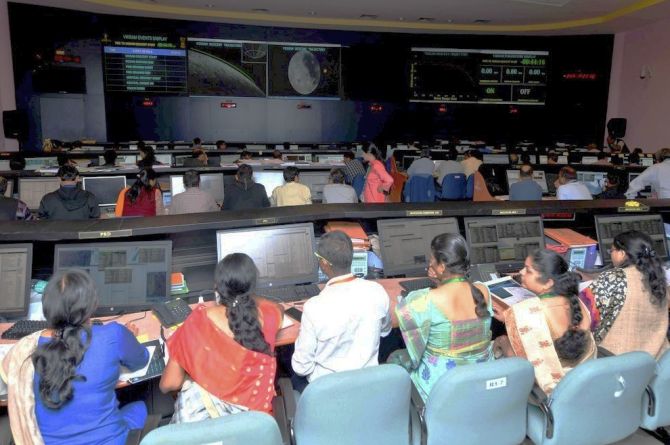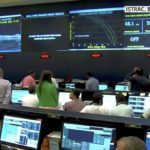The ‘Vikram’ lander lies on the lunar surface as a single piece, unbroken and it is in a tilted position following a hard landing while efforts to re-establish link with the probe were on, an ISRO official said on Monday.
Vikram, which encases rover ‘Pragyan’ went out of contact during its final descent, when it was just 2.1 km above the lunar surface, in the early hours of September 7.
“The lander is there (on lunar surface) as a single piece, not broken into pieces. It’s in a tilted position,” an ISRO official associated with the mission claimed.
Though the lander hit the surface hard while landing, it was still very close to the scheduled touchdown site as per the images sent by the orbiter’s onboard camera, he said.
“We are making all-out efforts to see whether communication can be re-established with the lander,” the official said.
“An ISRO team is the on the job at ISRO Telemetry, Tracking and Command Network (ISTRAC),” he added.
Chandrayaan-2 comprises an orbiter, lander (Vikram) and rover (Pragyan).
The mission life of the lander and rover is one lunar day, which is equal to 14 earth days.
ISRO chairman K Sivan had said on Saturday that the space agency would try to restore link with the lander for 14 days, and reiterated the resolve on September 8 after the orbiter’s camera spotted it on the Lunar surface.
An ISRO official said chances of restoring link with the lander were bleak since its system functionality was a prerequisite to achieve that.
“Unless and until everything is intact (in lander), it’s very difficult (to re-establish contact). Chances are less. Only if it had soft-landing, and if all systems functioned, then only communication can be restored. Things are bleak as of now,” the official said.
Another space agency official, though felt that chances did exist for restoring link, however, listed the limitations involved.
Recalling ISRO’s experience of recovering a spacecraft that went out of contact in the geostationary orbit, he said the lander’s case was dissimilar.
In the case of Vikram, “that kind of operational flexibility is not there,” since it is already on the lunar surface and it cannot be reoriented, he said.
A vital aspect is positioning of antennas and these have to be pointed towards either the ground station or the orbiter, he said.
“Such an operation is extremely difficult,” he said adding “we will have to keep our fingers crossed.”
The official said, however, the lander’s generating power was not an issue since it had solar panels all around it and encompasses internal batteries as well which are not used much.
Vikram carried three payloads — Radio Anatomy of Moon Bound Hypersensitive Ionosphere and Atmosphere (RAMBHA), Chandra’s Surface Thermo-physical Experiment (ChaSTE) and Instrument for Lunar Seismic Activity (ILSA).
Via: PTI. All rights reserved. Republication or redistribution of PTI content, including by framing or similar means, is expressly prohibited without the prior written consent.




